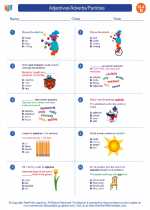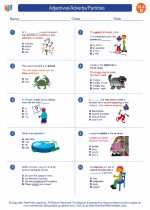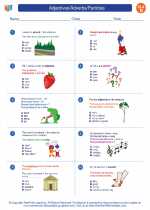Adjectives/Adverbs/Particles -> nouns
Nouns Study Guide
A noun is a word that represents a person, place, thing, or idea. Nouns are one of the basic parts of speech and are essential for constructing sentences.
Types of Nouns
- Common Nouns: These are general, non-specific nouns that refer to people, places, and things. Example: dog, city, book.
- Proper Nouns: These are specific names of people, places, or things and are always capitalized. Example: John, Paris, Coca-Cola.
- Abstract Nouns: These nouns refer to ideas, emotions, qualities, or states. Example: love, courage, happiness.
- Collective Nouns: These nouns refer to groups of people or things. Example: team, herd, family.
- Countable Nouns: These are nouns that can be counted and have singular and plural forms. Example: apple, apples.
- Uncountable Nouns: These are nouns that cannot be counted and do not have a plural form. Example: water, furniture.
Functions of Nouns
Nouns can function in different ways within a sentence:
- Subject: The noun that performs the action in a sentence. Example: The cat chased the mouse. (Cat is the subject)
- Object: The noun that receives the action in a sentence. Example: She bought a new car. (Car is the object)
- Possessive: The noun that shows ownership or possession. Example: Tom's bike is red. (Tom's is possessive)
Practice Questions
Now that you've learned about nouns, let's test your knowledge with some practice questions:
- Identify the type of noun in each sentence:
- The Eiffel Tower is in Paris.
- We had a delicious meal at the restaurant.
- His bravery inspired others to act.
- Write a sentence using a collective noun.
Conclusion
Understanding nouns is crucial for building strong language skills. Practice identifying different types of nouns and using them effectively in your writing to improve your language proficiency.
[Nouns] Related Worksheets and Study Guides:
.◂English Language Arts Worksheets and Study Guides Fourth Grade. Adjectives/Adverbs/Particles
Worksheet/Answer key Adjectives/Adverbs/Particles
Adjectives/Adverbs/Particles  Worksheet/Answer key
Worksheet/Answer key Adjectives/Adverbs/Particles
Adjectives/Adverbs/Particles  Worksheet/Answer key
Worksheet/Answer key Adjectives/Adverbs/Particles
Adjectives/Adverbs/Particles 

 Worksheet/Answer key
Worksheet/Answer key
 Worksheet/Answer key
Worksheet/Answer key

The resources above cover the following skills:
Language Standards
Conventions of Standard English
Demonstrate command of the conventions of Standard English grammar and usage when writing or speaking. [L.4.1]
Order adjectives within sentences according to conventional patterns (e.g., a small red bag rather than a red small bag). [L.4.1d]